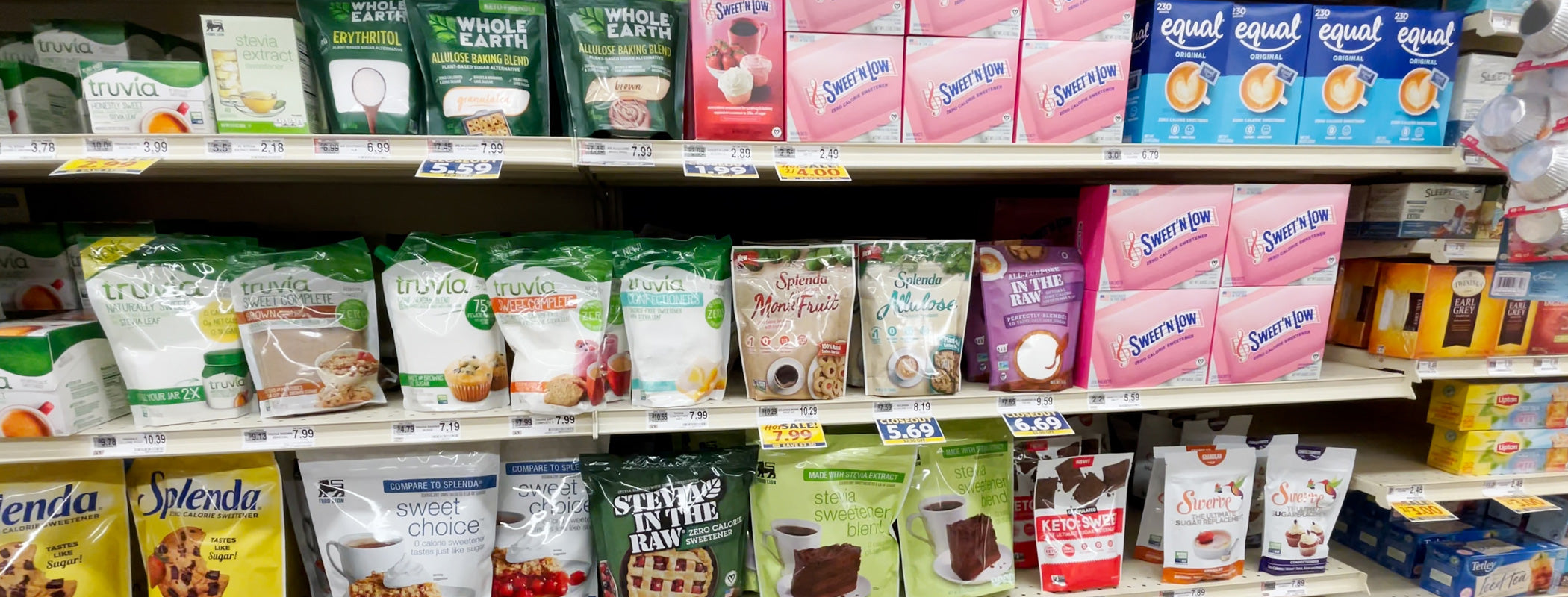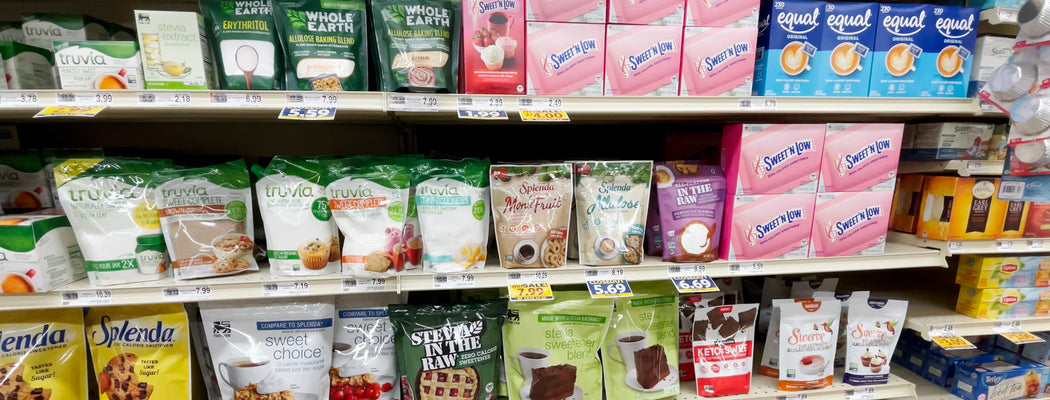In an effort to eat healthier, many people reduce their intake of added sugars. This has led to a surge in the popularity of sugar substitutes, such as sugar alcohols. If you’re health-conscious —or you have a pre-existing condition— you likely pay attention to food labels. But how much do you really know about products that use sugar alcohols and other sugar substitutes used as sweeteners?
What are sugar alcohols?
The term itself is actually misleading: There is no sugar in sugar alcohols, and there’s no alcohol, either. Sugar alcohols are a type of carbohydrate and have a chemical structure that’s similar to sugar. They are considered to be low calorie sweeteners that have about 25-75% fewer calories per gram than regular sugar. Though they occur naturally in some foods, the majority of sugar alcohols found in packaged foods are man-made and manufactured. You can usually spot many sugar alcohols on ingredient lists by "-ol" at the ends of their names.
There are eight sugar alcohols approved for human consumption:- Xylitol
- Erythritol
- Sorbitol
- Maltitol
- Mannitol
- Hydrogenated starch hydrolysates (HSH)
- Isomalt
- Lactitol
Of these, xylitol, erythritol, and Maltitol are the most widely used in the food industry. This is because their flavor most closely resembles the taste of regular sugar.
What do sugar alcohols do?
Food manufacturers use sugar alcohols to sweeten their products while reducing calories. Sugar alcohols stimulate the tongue’s sweet taste buds, which adds flavor without extra sugar or calories. Food companies use them so that they can market their foods as "low-carb", "sugar-free", "no added sugar" or "diabetes-friendly" without sacrificing taste.
If a product has sugar alcohols, you will see “Sugar Alcohol” listed under Total Carbohydrates on the Nutrition Facts label. You can then scan the ingredient list to see which sugar alcohols were added.
Sugar Alcohols are also used as bulking agents, and to help preserve moisture and improve the texture of foods.
Are they a healthy sugar swap?
The downside of sugar alcohols
Your small intestine doesn't absorb sugar alcohols well, so fewer calories get into your body. But because sugar alcohols aren't completely absorbed, if you eat too much it can cause gastrointestinal (GI) problems, such as abdominal pain, diarrhea, or loose stools. They can also have a "laxative effect".
Foods containing sugar alcohols tend to be highly processed. Because highly-processed foods are linked to increased appetite, weight gain, and diabetes, it’s best to avoid them altogether. Sugar alcohols are low in calories and carbs, but not free of them. So, you can still gain weight when you’re eating foods that contain sugar alcohols, especially if you eat them in excess.
Often labeled as ‘diabetes-friendly’ or ‘calorie-free,’ erythritol warrants caution. A recent study shows that erythritol is closely associated with an increased risk for "major adverse cardiovascular events," including heart attack, stroke and blog clots.
The sugar alcohol xylitol is highly toxic to dogs and can cause serious health problems or death if accidentally ingested.
The upside of sugar alcohols
Sugar alcohols may offer a healthier alternative to sugar because of their lower calorie content and reduced glycemic response. They break down slowly in the gut. Hence, your body only absorbs part of their overall carbohydrates. This keeps your blood sugar and insulin levels from spiking as they do with sugar. Thus, they can be a good option for people with diabetes.
When used in chewing gum, xylitol makes it taste just as sweet and studies show it helps in the prevention of tooth cavities in comparison to sugar.

What about other sugar substitutes and artificial sweeteners?
Blue, pink, yellow, green—there is a whole rainbow of colors for sugar substitutes offered today. The term “sugar substitutes” refers to high intensity sweeteners, artificial sweeteners, non-nutritive sweeteners, and other low-calorie sweeteners. Common sugar substitutes include aspartame, saccharin, Sucralose, monk fruit extract, stevia, allulose, acesulfame potassium (ace-K), and cyclamate.
Sugar alcohols are sometimes referred to as artificial sweeteners, a category that includes aspartame and saccharin, but they’re actually not the same thing. Though they’re both manufactured, they differ in a couple of key ways:- Sugar alcohols have very few calories, and they’re about 40-80% as sweet as natural sugar.
- Artificial sweeteners, on the other hand, are synthetic chemicals that provide an intense level of sweetness and no calories. They are 200 to 600 times sweeter than sugar and added to foods so that our tastebuds perceive a sweet taste without adding any calories to our diet.
The argument for artificial sweeteners can certainly seem appealing on the surface. All the sweet, sweet taste of sugar, but with no calories. However, research shows that long-term use of artificial sweeteners may be particularly detrimental to your body.
Early research suggested there may be a connection between cancer and artificial sugar. That connection hasn’t been proven definitively. But research has shown that consuming artificial sweeteners is linked to a range of other health conditions, including:
- Obesity
- Hypertension
- Higher risk of stroke in women
- Metabolic syndrome
- Type 2 diabetes
- Heart disease
In addition, artificial sweeteners are addicting. Eating sugar releases dopamine, the feel-good chemical that brings on pleasure. Laura Iu, R.D.N., certified intuitive eating counselor says, “Artificial sweeteners are tricky in that they trick the brain into thinking that you had sugar but ultimately your body knows that you did not eat it so what ends up happening is that you're likely to end up craving more sugar!”
Artificial sweeteners – which can be up to 600 times sweeter than sugar – completely bombard your nervous system with that dopamine-releasing sweetness. Your body starts to crave more of it. So, you reach for more artificially sweetened foods. And it can be easier to give in to that craving because you think you’re making a healthier choice — hey, it’s low-calorie, right? However, you wind up consuming more calories. That psychological mindset and the sweetness addiction can lead to health effects throughout your body.

So what could be better?
Well, as it turns out … sugar. Sugar is better for you than artificial sweeteners. Or even better yet — no added sugar. That’s your absolute best bet.
When it comes to sugar consumption, the less you eat the better. But for most of us, the problem is with added sugars, not natural sugars.
Your body doesn’t process natural sugars as quickly as it does added sugars or artificial sweeteners. So, eating natural sugars doesn’t give you the rollercoaster effect of driving up your blood sugar up, followed by a blood sugar drop, which makes you crave more sugar and carbohydrates — over and over and over again.
Added sugars are digested quickly, so you don’t feel full after eating them. In addition, Maya Feller, M.S., R.D., C.D.N., owner of Maya Feller Nutrition says, “Research has shown that consistently high intakes of added sugars reduces the proportion of beneficial bacterial in the gut while decreasing the diversity of gut bacteria.” Natural sugars, on the other hand, offer up that bit of sweetness and fiber, which fills up your stomach. And you can enjoy them without them lighting up the areas of your brain that leave you wanting more and more.
So, for most people, natural sugars and no added sugar are a far better alternative to either artificial sweeteners or regular table sugar.
 Bars
Bars
 Bear Claws
Bear Claws
 Merch
Merch
 Variety Packs
Variety Packs
 Shop All
Shop All
 Our Story
Our Story
 Sustainability
Sustainability
 Ingredients & Certifications
Ingredients & Certifications
 Artist Collaborations
Artist Collaborations
 FAQs
FAQs







